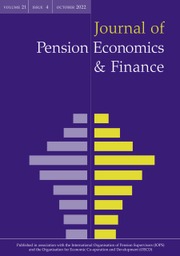No CrossRef data available.
Article contents
Self-employment in Italy: the role of Social Security Wealth
Published online by Cambridge University Press: 24 August 2017
Abstract
Using a rich micro dataset drawn from administrative archives, we explore whether Social Security Wealth (SSW) is an important factor affecting the decision to become self-employed. We focus on the two main categories of self-employed professions covered by the Italian public pension system: craftsmen and shopkeepers. We use the large exogenous variation in individual expected SSW that occurred as a result of the policy reform process undertaken in Italy during the 1990s to identify the effect of this variable and we study how the probability of being self-employed or employed depends, amongst other things, on the difference in the expected SSW that accrues under the two alternative employment scenarios. Our key finding is that a higher difference in expected SSW from self-employment compared with employment has a positive effect on the probability of being self-employed and on the probability of switching to self-employment, whereas it has a negative effect on the probability of switching from self-employment to employment.
- Type
- Article
- Information
- Copyright
- Copyright © Cambridge University Press 2017
Footnotes
We would like to thank Mariacristina De Nardi, Stefan Hochguertel, Mauro Mastrogiacomo and the participants at the Netspar International Pension Workshop (Leiden, 2016) for their helpful comments. The financial support from the Netspar Large Vision grant ‘A “second and a half” pillar for the self-employed?’ is gratefully acknowledged.


